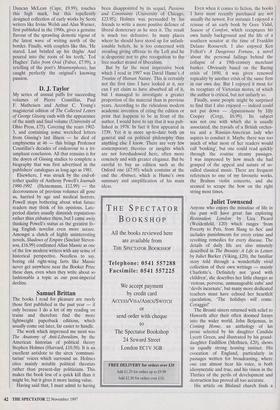Samuel Brittan
The books I read for pleasure are rarely those first published in the past year — if only because I do a lot of my reading on trains and therefore find the more lightweight paperback editions, which usually come out later, far easier to handle.
The work which impressed me most was The Anatomy of Anti-Liberalism, by the American historian of political theory Stephen Holmes (Harvard, £10.50). It is an excellent antidote to the siren 'communi- tarian' voices which surround us. Holmes cites mainly notable political theorists rather than present-day politicians. This makes the book less of a quick kill than it might be, but it gives it more lasting value.
Having said that, I must admit to having been disappointed by its sequel, Passions and Constraints (University of Chicago, £23.95). Holmes was persuaded by his friends to write a more positive defence of liberal democracy as he sees it. The result is much too defensive. In many places where he should have stood up for unfash- ionable beliefs, he is too concerned with avoiding giving offence to the Left and he is desperate not to give recognition to the free market strand of liberalism.
But by far the most impressive book which I read in 1997 was David Hume's A Treatise of Human Nature. This is certainly not the first time I have looked at it, nor can I yet claim to have absorbed all of it, but I managed to investigate a greater proportion of the material than in previous years. According to the ridiculous modern academic invention of citing the edition or print that happens to be in front of the author, I would have to say that it was pub- lished in 1978. In fact it first appeared in 1739. Yet it is more up-to-date both on general and on political philosophy than anything else I know. There are very few contemporary theories or insights which are not foreshadowed here, often more concisely and with greater elegance. But be careful to buy an edition such as the Oxford one (E7.95) which contains at the end the Abstract, which is Hume's own summary and simplification of his main ideas. Even when it comes to fiction, the books I have most recently purchased are not usually the newest. For instance I enjoyed a reissue of an early book by Gore Vidal, Season of Comfort, which recaptures his own family background and the life of a southern senator at the time of Franklin Delano Roosevelt. I also enjoyed Ken Follett's A Dangerous Fortune, a novel about the personal failings behind the collapse of a 19th-century merchant banker. Obviously based on the Baring crisis of 1890, it was given renewed topicality by another crisis of the same firm in our own day. But I enjoyed it most for its recapture of Victorian mores, of which the author is critical, but not unfairly so.
Finally, some people might be surprised to find that I also enjoyed — indeed could not put down — Appassionata by Jilly Cooper (Corgi, £6.99). Its subject was not one with which she is usually associated, the travails of a British orches- tra and a Russian-American lady who aspires to conduct it. Maybe there was too much of what most of her readers would call `bonking', but one could read quickly through the routine steamy passages. I was impressed by how much she had grasped of the appeal and nature of so- called classical music. There are frequent references to one of my favourite works, the Brahms • violin concerto, and she seemed to scrape the bow on the right string most times.


















































































 Previous page
Previous page